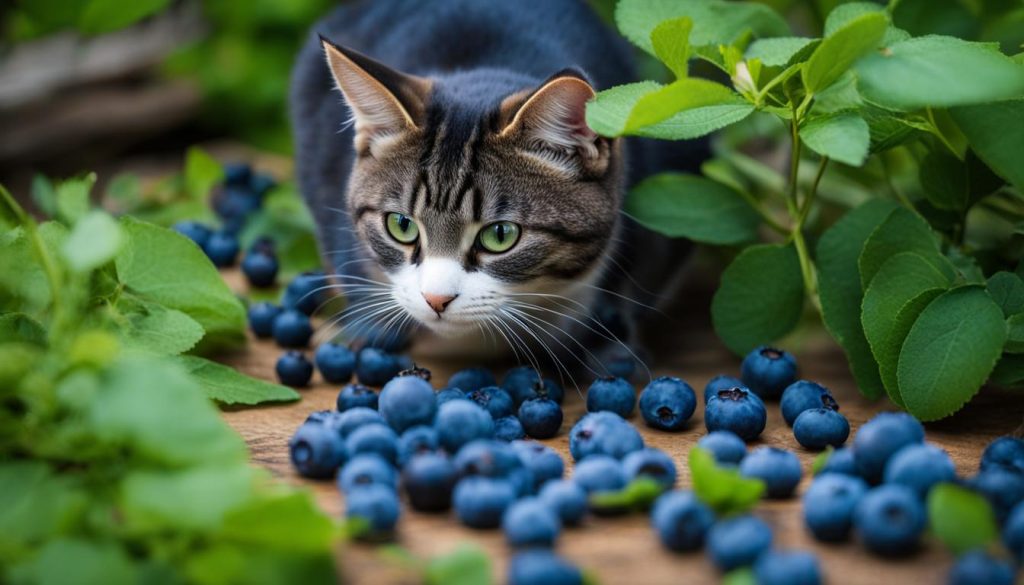Greetings fellow cat lovers! Today, I’m here to address a common question that many cat owners have: Can cats eat blueberries? As we strive to provide the best care for our feline friends, it’s important to understand what foods are safe and beneficial for their well-being. So, let’s dive into the world of cat-friendly fruits and explore the truth about blueberries in a cat’s diet.
Can Cats Eat Blueberries? Yes, but in small quantities.
- Cats can eat blueberries in moderation as a treat, but they should not replace essential proteins and amino acids in their diet.
- Blueberries provide antioxidants, vitamins, and fiber, but they are not necessary for a cat’s nutritional needs.
- Cats primarily require animal-based proteins for optimal nutrition.
- When introducing blueberries to your cat, do so gradually and observe their reaction.
- Remember, not all cats will enjoy blueberries, and their dietary needs should always be prioritized.
Understanding the Nutritional Profile of Blueberries
Blueberries have gained popularity as a superfood for humans due to their rich antioxidant content, vitamins, and dietary fiber. But what about cats? Can they enjoy the same nutritional benefits from these small berries? Let’s delve into the nutritional profile of blueberries and their role in a cat’s diet.
Blueberries are indeed packed with essential nutrients that can support overall health. They are a great source of antioxidants, which help combat harmful free radicals in the body. Additionally, blueberries contain vitamins such as vitamin C and vitamin K, along with dietary fiber, which aids in digestion.
However, it’s important to note that cats have unique dietary requirements compared to humans. While blueberries may offer some nutritional benefits, they should not be a staple in a cat’s diet. Cats primarily need animal-based proteins for optimal nutrition, and blueberries should only be given as an occasional treat. It is crucial to prioritize a well-balanced cat diet that includes high-quality protein sources to meet their specific dietary needs.
The Role of Blueberries in a Cat’s Diet
While blueberries may not be a necessary part of a cat’s nutrition, they can still be offered as a safe fruit treat. When feeding blueberries to your cat, ensure they are washed thoroughly to remove any potential pesticides. Remove the stems to prevent choking hazards, and consider mashing or chopping the blueberries into small pieces for easier consumption.
Remember, not all cats may enjoy the taste of blueberries, and that’s perfectly fine. It’s essential to respect your cat’s preferences and observe their reaction when introducing new foods. If your cat shows no interest in blueberries or experiences any negative reactions, it’s best to stick to their regular diet and provide other cat-friendly treats instead.

While blueberries offer some nutritional benefits, they should not replace a cat’s regular diet. Blueberries can be given as an occasional treat, but their primary source of nutrition should come from animal-based proteins. As responsible pet owners, it’s important to prioritize the overall well-being of our feline friends by providing them with a balanced and species-appropriate diet.
Exploring the Benefits and Risks of Blueberries for Cats
When it comes to adding blueberries to your cat’s diet, it’s important to consider both the potential benefits and risks. Blueberries contain antioxidants that can offer mild health benefits to cats. These antioxidants help neutralize free radicals and support immune health. However, it’s important to note that while blueberries have some nutritional value, they are not crucial for a cat’s overall well-being.
Cats have unique dietary requirements that primarily revolve around animal-based proteins. While blueberries may provide antioxidants, vitamins, and fiber, they should only be offered to cats as an occasional treat. It’s important to maintain a balanced diet that focuses on meeting the cat’s essential nutritional needs. Blueberries should not replace the necessary proteins and amino acids that cats require for optimal health.
When introducing blueberries to your cat’s diet, it’s crucial to do so in moderation and observe their reaction. Not all cats may be interested in the taste of blueberries, as their taste preferences can vary. Make sure to wash the blueberries thoroughly, remove the stems, and consider mashing or chopping them into small portions for easier consumption. Remember, blueberries should only supplement a cat’s diet and not become a staple food source.
Introducing Blueberries to Your Cat’s Diet
When it comes to introducing new foods to your cat’s diet, it’s essential to proceed with caution and monitor their reaction. Cats can be quite finicky when it comes to their taste preferences, so not all cats will be interested in trying blueberries. However, if you’d like to give it a try, there are a few steps you can follow to make the introduction smoother.
First and foremost, it’s important to wash the blueberries thoroughly to remove any potential pesticides or dirt. Then, remove the stems from the blueberries, as they can be a choking hazard for cats. To make it easier for your feline friend to eat, you can mash or chop the blueberries into small portions.
Start Slowly
Start by offering a tiny piece of blueberry to your cat and observe their reaction. If they show interest and enjoy it, you can gradually increase the portion size. However, if your cat doesn’t seem interested or doesn’t react positively, it’s best not to force them to eat blueberries. Every cat is unique, and their preferences may vary.
Remember, while blueberries can provide some nutritional benefits, they should not replace the essential proteins and amino acids that cats need. They should only be given as an occasional treat and not become a staple in their diet.
Conclusion
Can cats eat blueberries? Yes, they can! However, it’s important to remember that blueberries should only be given to cats in moderation as an occasional treat. While blueberries offer some nutritional benefits, they are not essential for a cat’s health.
Cats have unique dietary requirements, and their optimal nutrition comes from animal-based proteins. Blueberries can be a fun addition to their diet, providing antioxidants, vitamins, and fiber. But they should never replace their regular food.
So, if you’re considering introducing blueberries to your feline friend, remember to do so gradually and observe their reaction. Some cats may enjoy the taste, while others may not be interested. Wash the blueberries, remove the stems, and consider mashing or chopping them into small portions for easier consumption.
Always prioritize your cat’s well-balanced diet tailored to their specific needs. While blueberries can be a tasty and healthy treat, they should never take the place of their essential proteins and amino acids. So go ahead and let your cat enjoy a few blueberries from time to time, but remember to keep their diet primarily focused on quality animal-based nutrition.
FAQ
Can cats eat blueberries?
Yes, cats can eat blueberries in moderation as a treat. However, they should not replace essential proteins and amino acids in their diet.
Are blueberries necessary for a cat’s nutritional needs?
No, blueberries are not necessary for a cat’s nutritional needs. Cats require animal-based proteins for optimal nutrition.
What benefits do blueberries provide for cats?
Blueberries provide antioxidants, vitamins, and fiber. They may offer mild benefits to cats’ health, such as neutralizing free radicals and supporting immune health.
How should I introduce blueberries to my cat?
It’s important to introduce blueberries to your cat gradually and observe their reaction. Blueberries should be washed, stems removed, and may be mashed or chopped into small portions for easier consumption.
Will all cats enjoy eating blueberries?
Not all cats will enjoy eating blueberries due to their unique taste preferences. It’s essential to prioritize their dietary needs and offer blueberries as an occasional treat.






